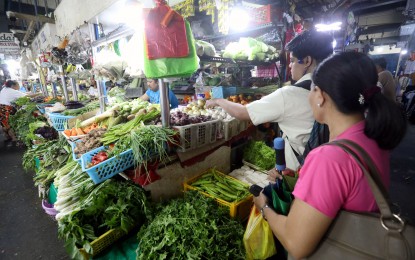
HEADLINE INFLATION. The Bangko Sentral ng Pilipinas on Tuesday (April 30, 2024) says inflation may settle within the 3.5 to 4.3 percent range in April. Inflation is the rate at which the overall prices of goods and services have increased over time. (PNA file photo by Yancy Lim)
MANILA – Economic managers will meet officials of the Department of Agriculture (DA) to ramp up government interventions to better address food inflation.
"Our next economic managers meeting will be with the DA so we can focus on food inflation," Finance Secretary Ralph Recto told reporters in an interview late Monday.
Headline inflation settled at 3.7 percent in March this year while food inflation hit 5.7 percent.
Recto said the government is looking at ways to reduce inflation.
"Inflation is still the biggest worry. If we can reduce inflation, GDP (gross domestic product) growth will be higher. So we're looking at that," he said.
Recto said economic managers expect inflation to breach the government's 2 to 4 percent inflation target in the second or third quarter of the year but will settle back within target in the latter part of the year.
"That's always been expected, maybe in the second or third quarter according to the BSP (Bangko Sentral ng Pilipinas) but within the year we expect that it will still be within the range of 2-4 [percent]," he said.
In a statement on Tuesday, the BSP said April 2024 inflation is projected to settle within the 3.5 to 4.3 percent range.
The BSP said the continued price increases for rice and meat along with higher gasoline prices and the peso depreciation are the primary sources of upward price pressures for the month.
Lower prices of fish, fruits, vegetables as well as lower electricity rates and the rollback in liquefied petroleum gas prices, however, could offset the upside price pressures.
"I prefer that it will be lower than 3.9 or 3.8 percent, if possible 2.9 [percent], closer to 2 will be better, then our GDP will be higher," Recto said.
To help lower food prices, President Ferdinand R. Marcos Jr. earlier issued Administrative Order (AO) 20 which eases the importation process for agricultural products.
Recto said aside from AO 20, part of the government's plan is to increase agricultural productivity. (PNA)
